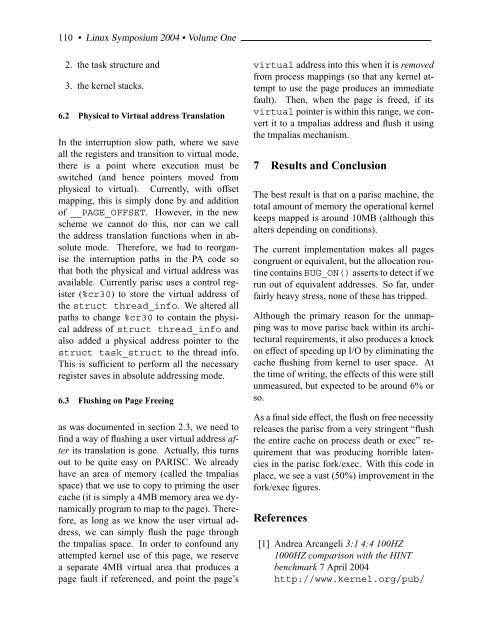You also want an ePaper? Increase the reach of your titles
YUMPU automatically turns print PDFs into web optimized ePapers that Google loves.
110 • <strong>Linux</strong> Symposium 2004 • Volume <strong>One</strong><br />
2. the task structure and<br />
3. the kernel stacks.<br />
6.2 Physical to Virtual address Translation<br />
In the interruption slow path, where we save<br />
all the registers and transition to virtual mode,<br />
there is a point where execution must be<br />
switched (and hence pointers moved from<br />
physical to virtual). Currently, with offset<br />
mapping, this is simply done by and addition<br />
of __PAGE_OFFSET. However, in the new<br />
scheme we cannot do this, nor can we call<br />
the address translation functions when in absolute<br />
mode. <strong>The</strong>refore, we had to reorganise<br />
the interruption paths in the PA code so<br />
that both the physical and virtual address was<br />
available. Currently parisc uses a control register<br />
(%cr30) to store the virtual address of<br />
the struct thread_info. We altered all<br />
paths to change %cr30 to contain the physical<br />
address of struct thread_info and<br />
also added a physical address pointer to the<br />
struct task_struct to the thread info.<br />
This is sufficient to perform all the necessary<br />
register saves in absolute addressing mode.<br />
6.3 Flushing on Page Freeing<br />
as was documented in section 2.3, we need to<br />
find a way of flushing a user virtual address after<br />
its translation is gone. Actually, this turns<br />
out to be quite easy on PARISC. We already<br />
have an area of memory (called the tmpalias<br />
space) that we use to copy to priming the user<br />
cache (it is simply a 4MB memory area we dynamically<br />
program to map to the page). <strong>The</strong>refore,<br />
as long as we know the user virtual address,<br />
we can simply flush the page through<br />
the tmpalias space. In order to confound any<br />
attempted kernel use of this page, we reserve<br />
a separate 4MB virtual area that produces a<br />
page fault if referenced, and point the page’s<br />
virtual address into this when it is removed<br />
from process mappings (so that any kernel attempt<br />
to use the page produces an immediate<br />
fault). <strong>The</strong>n, when the page is freed, if its<br />
virtual pointer is within this range, we convert<br />
it to a tmpalias address and flush it using<br />
the tmpalias mechanism.<br />
7 Results and Conclusion<br />
<strong>The</strong> best result is that on a parisc machine, the<br />
total amount of memory the operational kernel<br />
keeps mapped is around 10MB (although this<br />
alters depending on conditions).<br />
<strong>The</strong> current implementation makes all pages<br />
congruent or equivalent, but the allocation routine<br />
contains BUG_ON() asserts to detect if we<br />
run out of equivalent addresses. So far, under<br />
fairly heavy stress, none of these has tripped.<br />
Although the primary reason for the unmapping<br />
was to move parisc back within its architectural<br />
requirements, it also produces a knock<br />
on effect of speeding up I/O by eliminating the<br />
cache flushing from kernel to user space. At<br />
the time of writing, the effects of this were still<br />
unmeasured, but expected to be around 6% or<br />
so.<br />
As a final side effect, the flush on free necessity<br />
releases the parisc from a very stringent “flush<br />
the entire cache on process death or exec” requirement<br />
that was producing horrible latencies<br />
in the parisc fork/exec. With this code in<br />
place, we see a vast (50%) improvement in the<br />
fork/exec figures.<br />
References<br />
[1] Andrea Arcangeli 3:1 4:4 100HZ<br />
1000HZ comparison with the HINT<br />
benchmark 7 April 2004<br />
http://www.kernel.org/pub/

















